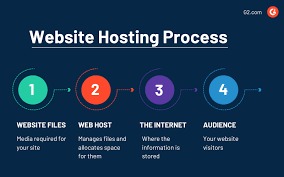Introduction:
In the vast landscape of the internet, where websites populate the digital realm like buildings in a city, hosting stands as the foundation upon which these virtual structures are erected. For many, the term “hosting” might seem like a mysterious concept, shrouded in technical jargon and complexities. However, at its core, hosting is a fundamental aspect of establishing an online presence and ensuring that a website is accessible to users worldwide.
The Essence of Hosting:
At its simplest, website hosting refers to the process of storing and serving website files on a server connected to the internet. These servers are powerful computers specially configured to deliver web content swiftly and reliably to users who access the site through their web browsers. Think of hosting as renting space on the internet where your website’s files, including text, images, videos, and other multimedia elements, reside.

Types of Hosting:
There are various types of hosting services available, each catering to different needs and budgets:
- Shared Hosting: In shared hosting, multiple websites are hosted on a single server, with each website allocated a portion of the server’s resources. This option is often the most economical but may result in slower performance if neighboring sites experience high traffic.
- Virtual Private Server (VPS) Hosting: VPS hosting offers a middle ground between shared and dedicated hosting. While multiple websites still share the same physical server, each website operates within its own virtualized environment, providing more control and resources compared to shared hosting.
- Dedicated Hosting: With dedicated hosting, an entire server is dedicated to a single website or client, offering unparalleled performance, customization options, and security. This option is ideal for high-traffic websites or those with specific technical requirements.
- Cloud Hosting: Cloud hosting utilizes a network of interconnected servers to host websites, providing scalability and reliability by distributing resources across multiple servers. This flexibility makes it suitable for websites experiencing fluctuating levels of traffic.
The Importance of Reliable Hosting:
Reliable hosting is essential for ensuring that a website remains accessible to users at all times. A website hosted on an unreliable server may experience frequent downtime, resulting in lost traffic, revenue, and credibility. Additionally, slow-loading websites can frustrate users and negatively impact search engine rankings, further underscoring the importance of choosing a reputable hosting provider.

Factors to Consider When Choosing a Hosting Provider:
When selecting a hosting provider for your website, several factors should be taken into account:
- Uptime Guarantee: Look for a hosting provider that offers a high uptime guarantee, ideally 99.9% or higher, to minimize the risk of downtime.
- Performance and Speed: Opt for a hosting plan that can deliver fast loading times to ensure a positive user experience and improve search engine rankings.
- Security Measures: Prioritize hosting providers that implement robust security measures, such as SSL certificates, firewalls, and regular backups, to safeguard your website and data from cyber threats.
- Scalability: Choose a hosting solution that can accommodate your website’s growth and scalability needs, allowing you to easily upgrade resources as your site expands.
- Customer Support: Consider the level of customer support offered by the hosting provider, including availability, responsiveness, and expertise, to ensure prompt assistance in case of any issues or concerns.
Conclusion:
In essence, hosting serves as the backbone of a website, providing the infrastructure and resources necessary for its existence on the internet. By understanding the significance of hosting and choosing a reliable provider that meets your website’s needs, you can ensure optimal performance, security, and accessibility for your online presence. Whether you’re launching a personal blog, an e-commerce store, or a corporate website, investing in quality hosting is essential for success in the digital age.
 Clear My Certification All Certification Exam Answers
Clear My Certification All Certification Exam Answers



